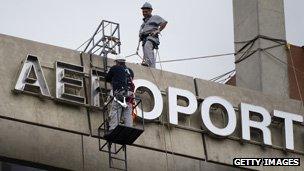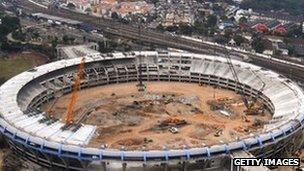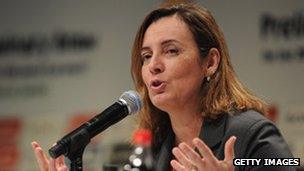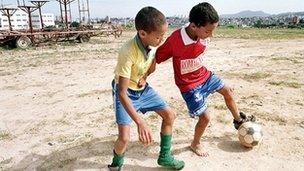Brazil confident World Cup will leave a lasting legacy
- Published

Brazil is spending millions of dollars improving its airports for the World Cup
Listen to any Brazilian official talking about their country hosting the 2014 World Cup, and the word they all use is "legacy".
And they say it all the time.
Speaking at the Soccerex global business industry convention in Rio de Janeiro, Marcia Lins, the state's Sport and Leisure Secretary, says: "This is about legacy... it really is a new Rio, a paradigm shift, we are not going to let this opportunity go by."
Put simply, Brazilian authorities are obsessed that the tournament will have a positive, lasting effect on the country.
Whether they will be successful, only time will tell, but here is a look at the four main areas they are focusing on - the new stadiums, boosting tourism, reducing crime, and improving infrastructure.
Stadium utilisation
Brazil is sparing no expensive on the World Cup stadiums. It is building six new ones, and substantially renovating the same number across the 12 host cities.
The work to renovate the famous Maracana stadium in Rio is costing 750m Brazilian real ($404m; £261m), but the stadium is deliberately not being expanded in size.
So instead of using the World Cup as an opportunity to return the Maracana to its historic giant capacity of 200,000, it will remain at around 85,000.

Stadium experts have praised the reconstruction work at the Maracana
Instead the money is being spent is on making the ground more comfortable for general supporters, plus newer executive boxes for the corporate market.
Andrea Sartori, a partner at accountancy group KPMG's sports advisory group, says Brazil is rightly trying to optimise the long-term capacity utilisation at the Maracana - how much money it makes per seat.
He adds: "The redevelopment of the Maracana is a perfect example of what to do when the World Cup is over."
However, the Maracana was always going to have a busy post-World Cup life, hosting the Brazilian national team, regular derby games between Rio's largest club teams, and rock concerts.
By contrast, some commentators question whether Brazil is spending too much money on World Cup stadiums in its smaller and more outer-lying cities, such as Manaus in the Amazon, and Fotaleza on the country's north-eastern coast.
"It does make you question what they are going to do with some of these grounds after the World Cup," says UK stadium expert Paul Fletcher.
"Whether they will be filled for club football games is questionable. And if they aren't properly utilised, they they'll lose money."
'Image promotion'
Regarding tourism, Brazil has ambitious legacy aims, and it knows exactly how it will achieve them.
The country aims to use a successful World Cup to help double incoming tourist numbers from 5.2 million in 2010 to more than 10 million by 2020.

Legacy is the buzz word at Soccerex
To do this, it wants to ensure that overseas football fans coming in 2014 have a safe and well-organised trip.
Ricardo Trade, who is Fifa's head organiser for 2014, said: "The legacy is that 600,000 people will leave Brazil talking well about it, and promoting our image abroad."
For the tourism legacy to be achieved, the safety issue is key, because Brazilian officials admit that the country has a problem with high crime levels.
'Safe city'
Yet permanently cutting crime in Brazil in the long-term is another of Brazil's World Cup legacy aims. And this is most apparent in Rio.
Ahead of the World Cup, armed police backed by navy marines have been taking control of the city's favelas or shanty towns, driving out drug gangs.
But instead of planning to pull out again after the tournament finishes, authorities say the police presence will be permanent.

Brazil wants the World Cup to help improve the country's future
In addition to cutting crime, they hope it will improve social mobility and cohesion.
Sergio Cabral, governor of Rio de Janeiro state, says: "Visitors to Rio will not only find a safe city during the World Cup and Olympics, but before, during and after.
"They will find good public transport before, during and after. And good sports facilities before, during and after."
The final legacy that the World Cup will give Brazilians is 22bn real of infrastructure investment, which is being spent on everything from improving airports, to new rail and bus systems, and roads.
As one Brazilian official jokes: "We are not going to rip it all up after 2014."
Ney Campello, in charge of World Cup preparations in the city of Salvador, says the World Cup is being used to renovate the old downtown area, build a new light rail network, and renovate both the city's airport and passenger port - and that these would be its lasting legacy.
He adds: "The World Cup is the catalyst for all this public work."